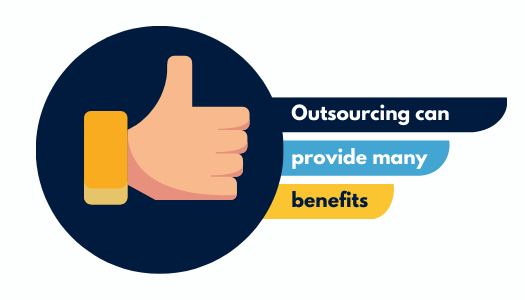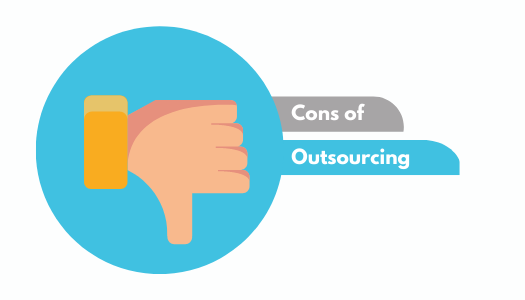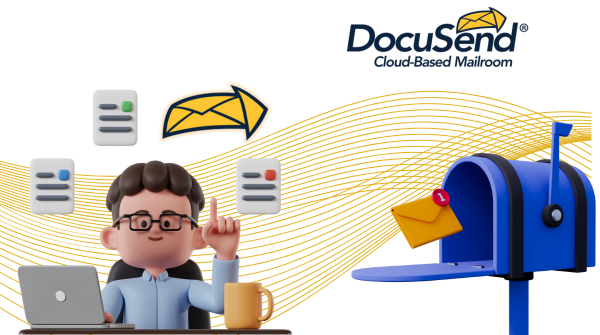How Outsourcing Can Make Your Small Business More Efficient

Jack of all trades. Wearer of many hats. Sound familiar? If you own or run a small business, these nomenclatures fit. But at what point do your patience, knowledge, and good intentions get stretched too thin?
For sure, human nature plays a part in wanting to be a go-getter who can accomplish everything on their own. While this can bring a sense of satisfaction, let’s be honest: we as humans cannot excel in everything, we need to get done in running our small businesses, especially if we want to make the best use of our time and money.
Granted, there are heaps of things required of you when you are an SMB owner. But can you really be self-sufficient in all the crucial areas? There’s HR, payroll, IT, customer care, accounting, manufacturing, shipping & receiving, mailing services, training, PR, security, and many other elements that go into making a success of your business.
Just reading this list is exhausting, isn’t it?
According to Investopedia, “Outsourcing is the business practice of hiring a party outside a company to perform services and create goods that traditionally were performed in-house by the company's own employees and staff. Outsourcing is a practice usually undertaken by companies as a cost-cutting measure. As such, it can affect a wide range of jobs, ranging from customer support to manufacturing to the back office.”
Important factors to consider when deciding whether to outsource include, but are not limited to, the cost of outsourcing, the time you’ll save on not doing these tasks yourself or keeping them in-house, the time spent managing the outsourced relationship, and the effect on company morale. You also need to contemplate your own expertise and strengths in addition to those of your personnel. Evaluate the repetitiveness or tediousness of tasks that are necessary for the success of your business. These can be ideal candidates for outsourcing to a firm that specializes in that task.

| Save money – Even though you’re spending money to have someone else manage a certain part of your business, it could result in lower costs in the long run. According to Microsourcing.com, 57% of companies cite cost reduction as their reason for outsourcing.. |
| Improve efficiencies – Your productivity could be boosted because you’re having an expert in that field perform those tasks. |
| Reduce training – By finding a specialized company, you eliminate internal staff training. |
| Keep you focused – You can continue to grow your business by concentrating on core areas that will help you increase revenue quicker. |
| Provide knowledge – Relying on a company that is already an expert can save you time and costly mistakes. |
| Speed up time to market – Instead of taking the time to build a new department or hire additional employees, outsourcing could help you streamline the time it takes to get your business up and running. |

| Cost – You will have to pay for the services provided. A cost analysis must be done to decide whether it’s more cost effective to outsource or to keep the task in-house. |
| Control – You may lose some oversight, and the task may be performed otherwise than if you kept it internal, so you’ll have to assess the differences. |
| Accountability – You’ll still need to manage the relationship and stay on top of the activities being performed. |
| Risk – Your business intelligence will be accessed by a third party. Are you willing to let others know your trade secrets or, at the very least, be aware that you have such? |
| Time – Factor in the time it will take to find the right freelancer or business associate that can perform the tasks required. |
| Culture – What effect will outsourcing have on employee morale? Will they fear that their jobs will be eliminated? |
So how do you decide which tasks or jobs would best be outsourced to a vendor?
It comes down to a cost and time analysis, resource availability, and customer and employee impact. It’s best to outsource when you don’t have the knowledge or expertise within your internal staff and don’t have the means to hire and train.
One of the more popular outsourced jobs is payroll. Even for a small firm with two or three employees, it doesn’t make sense to manage this job internally. To do so, you’d need to be an expert in tax law and payroll regulations. It’s not as simple as calculating the weekly wage and writing a check. There are deductions, taxes, disability, medical, 401K, and more that all need to be calculated and deducted from the gross pay. Staying on top of IRS regulations and state and federal laws could be a full-time job by itself. Evaluating the costs of using a payroll service is pretty cut-and-dried when you calculate the value of your time to stay on top of this complex process.
Another commonly outsourced function is in the world of IT. If you’re an SMB owner, you might not even have an IT person on staff, but you still need someone to manage and maintain the server, internet connection, phone lines, PCs, and printers. In this situation, hiring a firm with either a monthly maintenance contract or paying by the hour might make sense, especially if your IT equipment is newer and hopefully more reliable. This can be a time-sensitive outsourced task, so using an IT company with good response times is essential. For example, if your phone or internet lines are down, it can be highly disruptive to your customers and your workflow.
Customer care is another department that can often benefit from outsourcing. Think about the cost of keeping a 24x7 call center open. Instead, it might make sense to have internal staff handle calls during the regular business day, or perhaps 8am to 8pm, and outsource your overnight calls. This is common in the hotel industry and ensures that potential customers can reach you day and night without you going to the expense of staffing the phones 24 hours a day. But you’ll have to consider the amount of training that will be needed, what type of access you’ll provide the third-party vendor, and the quality of the agents handling the calls on your behalf.
And of course, I’d be remiss in not mentioning document distribution services. Look at your costs associated with printing and mailing customer invoices and letters. Some companies have an internal employee manage the mailroom process in their “down” time, but expenses include labor, materials, postage, and in some instances, monthly payments on postage meters and inserters. These can really add up. Also consider how best to serve your customers who prefer their documents delivered electronically. Using an all-in-one cloud-based document distribution service like DocuSend can be an easy and cost-effective way to ensure that paper documents are printed and mailed within two business days, and that emailed documents are sent in a secure link—with an option to resend as postal mail from your personal portal as backup for the links that don’t get opened.

Entrepreneurs have traditionally viewed outsourcing as something only large corporations could use cost effectively, but advancements in technology have made it accessible even to small businesses. For many small firms, outsourcing has significantly boosted their growth, productivity, and financial performance.
Is outsourcing right for your company? Only you can decide after careful analysis of the strengths and weaknesses of your internal processes and staff. Yes, it will take time to consider all the factors, but it’s time well spent if in the end your company will be more productive and profitable.
Please help other SMBs by sharing your outsourcing stories and both the positive and negative effect outsourcing has had on the success of your business.

